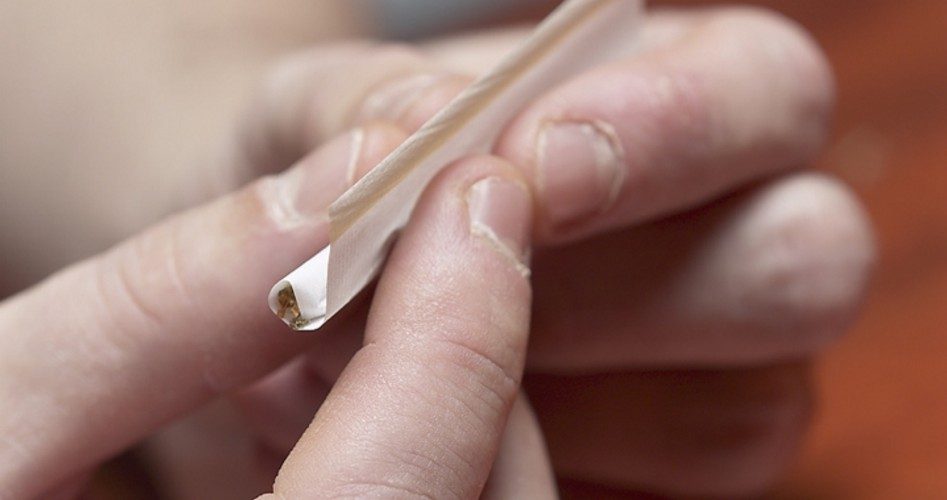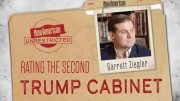
After former Florida Governor Jeb Bush admitted in an interview with the Boston Globe that he had smoked marijuana when he was a student at Phillips Academy in Andover, Massachusetts, Senator Rand Paul (R-Ky.) accused Bush of hypocrisy for opposing a Florida ballot initiative to allow the use of the drug for medical reasons. (Fifty-seven percent of Florida voters voted “yes” on the initiative, but since state law requires a supermajority of 60 percent or higher, it failed to pass.)
“I drank alcohol and I smoked marijuana when I was at Andover,” Bush told the Globe, which published the interview February 1. “It was pretty common.”
In an interview with The Hill newspaper while en route to a pair of political dinners in Dallas and Fort Worth, Paul, juxtaposing Bush’s opposition to the initiative with his past drug use, said:
You would think he’d have a little more understanding then.
He was even opposed to medical marijuana. This is a guy who now admits he smoked marijuana but he wants to put people in jail who do.
I think that’s the real hypocrisy, is that people on our side, which include a lot of people who made mistakes growing up, admit their mistakes but now still want to put people in jail for that.
Paul continued: “Had he been caught at Andover, he’d have never been governor, he’d probably never have a chance to run for the presidency.”
While the libertarian-leaning Paul — who, like his father, former Representative Ron Paul, is a medical doctor — has not called for the legalization of marijuana under ordinary circumstances, he has been a vocal critic of our federal government’s war on drugs. Fifteen years ago, when he was a practicing ophthalmologist and chairman of Kentucky Taxpayers United, he was a guest on the public affairs show Kentucky Tonight. When a caller suggested a plan to legalize all drugs and put the money that we spend to keep the drugs out of the country into Social Security, Paul, without specifically agreeing with the caller’s plan to legalize all drugs, said: “The war on drugs is an abysmal failure and a waste of money.”
Paul continued, saying, “We should better spend [the money] dealing with people, with their addiction problems, quit wasting all the money, sending the military to Bolivia to shoot farmers who are growing coca plants. That’s just ridiculous.”
The senior Paul addressed the federal war on drugs in a list of “Ten New Year’s Resolutions for Congress” posted online on January 5. Resolution number 10 took a states’ rights approach:
10) Allow state governments to opt out — If Congress lacks the votes to end the war on drugs, repeal Obamacare or roll back other unconstitutional federal programs, it should at least respect the rights of states to set their own policies in these areas. Federal prohibition of state laws nullifying Obamacare or legalizing marijuana turns the Tenth Amendment upside down.
Speaking at the Liberty Political Action Conference in Alexandria, Virginia, last September (where the two Pauls delivered a scholarship award), Senator Paul took aim not only at the federal war on drugs, but the resultant police militarization that has filtered down to the local level. “You want your police to be aggressive,” said Paul. “But if someone’s got some pot, [do] you want to break down the door at two in the morning with masks and gas and concussion grenades?”
Paul went on to criticize the disproportionately large arsenals of military equipment purchased by small communities, which he described as “crazy stuff.”
Some of that military-grade equipment, Paul said, has been used against marijuana users. Noting the number of people being injured during drug raids, Paul said the situation has “gotten out of control.”
“I’m ok with police using force,” he said, saying if his wife were taken hostage, he’d want the police to use sufficient force to save her. “But if somebody’s saying there’s some kid who’s got pot in the house, I think it’s a little crazy to have this war on drugs gone so far.”
After the House of Representatives voted to block the Drug Enforcement Administration and federal prosecutors from going after medical marijuana in states that allow it last May 30, Paul and Senator Cory Booker (D-N.J.) announced that they would sponsor a companion amendment in the Senate.
Opposition to the federal war on drugs and federal attempts to override state laws permitting medical marijuana are not the same as an endorsement of drug use, however. During the first Republican debate in Greenville, South Carolina, in 2011, former Representative Paul, then a presidential candidate, was asked by moderator Chris Wallace if he was suggesting that heroin and prostitution were an exercise of liberty. Paul replied: “How many people here would use heroin if it were legal? I bet nobody would.”
Paul continued, employing a touch of sarcasm: “Oh yeah, I need the government to take care of me. I don’t want to use heroin, so I need these laws.”
Of course, for the constitutionalist — a political label that could be applied to both Pauls — the issue is not whether various drugs, including marijuana, are good or bad for an individual. As medical doctors, both are undoubtedly aware of the harmful effects of all drug use.
An article posted by The New American last October cited a report from Dr. Wayne Hall, a professor of addiction policy at King’s College London. Professor Hall found about smoking marijuana:
• One in six teenagers who regularly smoke the drug become dependent on it.
• Cannabis doubles the risk of developing psychotic disorders, including schizophrenia.
• Cannabis users do worse at school. Heavy use in adolescence appears to impair intellectual development.
• One in ten adults who regularly smoke the drug become dependent on it and those who use it are more likely to go on to use harder drugs.
• Driving after smoking cannabis doubles the risk of a car crash, a risk which increases substantially if the driver has also had a drink.
• Smoking it while pregnant reduces the baby’s birth weight.
Dr. Hall’s report tells us something most of us already know, or at least suspect: Drug use is bad for you. (Whether the use of marijuana as a pain killer for certain medical conditions is justified is probably a decision best left to medical experts.) This leads to an ongoing disagreement that separates the more libertarian members of our society from those who think government should have a more paternalistic role: Should government prohibit a person from actions that are harmful to himself, such as riding a motorcycle without a helmet, or does each individual have the responsibility to take care of himself?
And even if, as some believe, government does have some role in preventing its citizens from harming themselves (as in prohibiting suicide, for example), the federal government certainly has no authority. The 10th Amendment is very clear that all powers not delegated to the federal government are reserved by the states or the people. It was for this reason that the Constitution had to be amended to enact the prohibition of alcohol beverages, since the Constitution never gave the power to prohibit alcohol (or drugs, for that matter) to the federal government.
The only question for the constitutionalist, therefore, is whether the power to regulate drugs belongs to the states or to the people. It never belongs to the federal government. A strict interpretation of the Constitution would even render the FDA unconstitutional, but that is another article.
Related articles:
UN Outraged After More U.S. States Nullify Global Pot Regime
UN Demands Obama Smash State Marijuana Legalization
UN Claims Uruguay Not Allowed to End Marijuana Prohibition
Obama Seeks “Flexibility” in UN Drug Prohibition Regime
On Pot Nullification, AG Holder Admits Limits to Federal Power
State vs. Federal: The Nullification Movement
U.S. Government and Top Mexican Drug Cartel Exposed as Partners
As UN Orders Expanded Global Drug War, Critics Fight Back
After Admitting Failure, UN Targets U.S. and Demands Expanded Drug War
Two States Defy Feds With Full Marijuana Legalization
The United Nations: On the Brink of Becoming a World Government
Latin America Debates Drug Legalization; Obama Demands More War on Drugs
The Other Unconstitutional War
Top UK Officials: UN-inspired War on Drugs Failed
Alabama Adopts First Official State Ban on UN Agenda 21
Pot Use Is Devastatingly Dangerous: Analysis of 20 Years of Studies



